You probably don’t think about your pool pump too much. It sits in the background, moving water through your pool system. So you never really have to worry about it aside from the occasional cleaning. But surprisingly enough, your pool pump is one of the most important parts of your pool system. It’s responsible for keeping your pool circulation in check. Helping you maintain a consistent flow of fresh, clean water.
[If you’re a new pool owner setting up your equipment for the first time, check out our pool owner guide]
But what happens when an essential part of your pool system stops working? When you can no longer run your pool. And the blazing summer heat only continues to intensify.
You don’t panic. You use your resources and learn how to troubleshoot your pool pump effectively. And with the help of a professional pool repair service, your pool can be back in action in the blink of an eye. But if you rather put in some DIY work first, this post is the very resource you need to figure out exactly what’s wrong with your pool pump. We outline the most common pool pump problems and break down all the possible causes. Leading you to the solution in minutes.
So without any further ado, here is our guide on how to troubleshoot your pool pump.
How To Troubleshoot Your Pool Pump
-Pool Pump Is Leaking
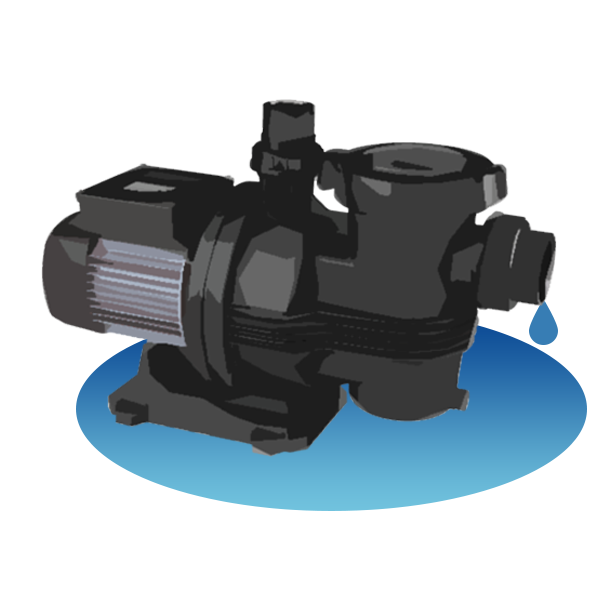


At one point or another, every pool owner will encounter a pool pump leak. It’s just part of the natural aging process. Luckily, fixing them isn’t as bad you may think. Here are some of the causes
Possible causes:
- Bad thread sealant
- Bad shaft seal
- Shrunken threads (discharge pipe)
- Broken or loose impeller housing o-ring
Most of these parts can be replaced , and will stop the leak immediately. But each pool pump is made differently, and it’s important to understand how yours is built. Because it makes fixing the worn out part a world easier. But if you’d like to get the job done quickly with no risk involved, consider a pool repair service.
-Pool pump is noisy
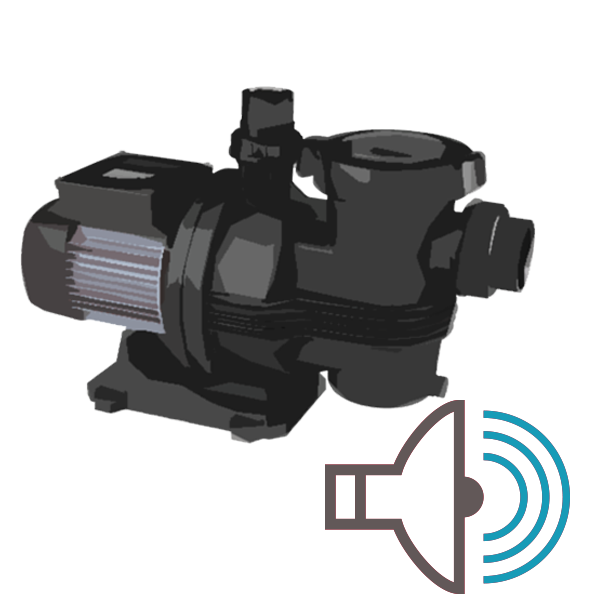


As much as we’d like to tell you otherwise, every pool pump will make at least some noise. But it’s important to know the difference between what’s natural, and what’s not. Because understanding that difference makes it much easier to troubleshoot your pool pump.
Possible causes:
- Cavitation | Loud rattling noise: Pump starved for water > Broken or worn impeller
- Vibrating noise: Base of pump is vibrating against surface of floor
- Screeching noise: Bearings need replacement
- Pump requires water
A vibrating noise can usually be fixed by placing a rubber (or equally absorbent material) mat under the pump to absorb the vibrations.
Eliminating rattling noises calls for opening up the pump and replacing the impeller. And possibly a few other parts depending on the condition of the impeller shaft and shaft seal.
Quieting a screeching noise also requires getting into the pump. But replacing the bearings should immediately stop the noise in its tracks.
-Pool pump is running hot/overheating
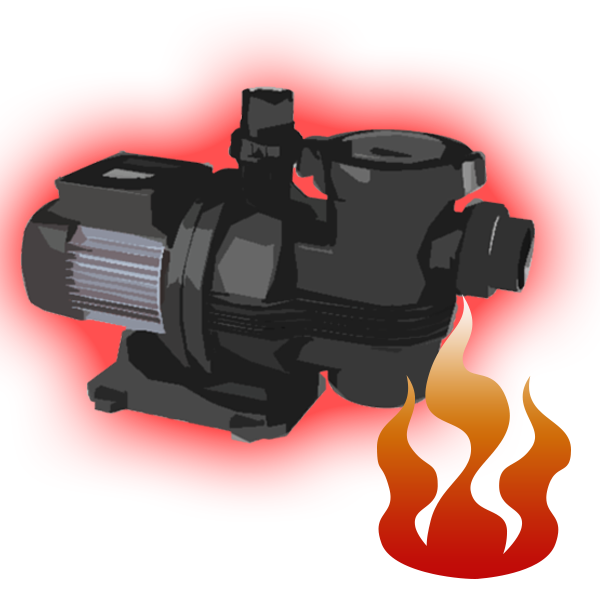


More times than not, you won’t really have to worry about your pool pump overheating. Light maintenance and regular use should keep it in perfectly good shape for a while. As a matter of fact, regularly running your pool pump on a schedule is one of our pool care tips. But there are still a few factors that can cause your pool pump to run hot without warning. Check for these symptoms when you go to troubleshoot your pool pump.
Possible causes:
- Air vents blocked
- Insufficient drainage
- Starved for water
The air vents are the first part you should check when your pump starts running hot. They’re quick to spot and easy to clear out. You may have to get inside the unit to clear out the vents completely, but you should notice an immediate difference.
Insufficient drainage happens when the area around the pump floods and essentially drowns the pump. Which causes it to heat up due to an inability to maintain water flow. This can be caused by rainfall, or the pump being positioned too deep past ground level. Try elevating the pool pump to a higher position.
If your pool pump is starved for water, it’ll overheat pretty fast. As the water acts as a coolant for your hard working pool pump. Similar to the relationship between coolant and car engines. So first check your water level, then look for any clogs in the pool system and within the pump, as well as any leaks.
*Side note: A water-starved pool pump is a particularly temperamental pool pump problem. Being that several other parts of your pool system are directly affected by your pumps ability to move water. Especially for your pool heater, which keeps your water warm. So if you notice your pool pump isn’t moving water, act as quickly as possible.
[Still trying to decide on a pool heater? This guide for buying a pool heater should help]
-Pool pump motor keeps turning off | Troubleshoot pool pump motor
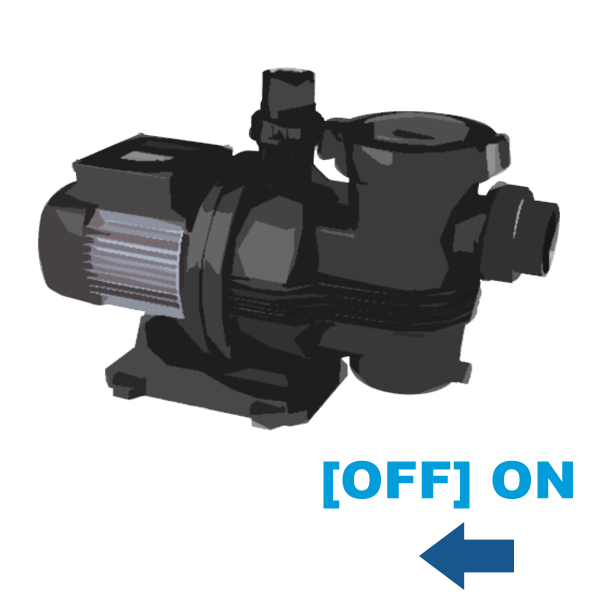


More times than not, a pool pump that continuously powers down is experiencing some type of power related issue. Although overheating can also cause a unit to shut down, in this scenario, let’s assume that the pump has an adequate water supply and good drainage.
Possible causes:
- Breaker issues
- Motor’s electrical system faulty
- Poor connection/undersized wire (lack of power)
First, check your breaker to see if your pool pump is receiving power. If it is, then you’re likely experiencing an electrical issue specific to the pump’s motor (or connection its connection).
A poor connection can indicate a loose or worn connector or improperly sized wiring. So first check for any tears or loose connectors at either end of the wire. Then check your manual and ensure you’re using the right gauge wire. Too thin of a wire can’t supply an adequate amount of power
As mentioned earlier, overheating can cause your motor to shut down (thermal overload). But in the case where thermal overload isn’t the problem, the motor itself can simply be worn out or in need of some light repair. It’s also possible that the pump capacitor is experiencing issues as well, which directly affects the motor. In either case, contacting a professional pool repair service is the best option. They’ll quickly identify the root of the problem, and help you further troubleshoot your pool pump if need be.
-Pool pump keeps turning off and on
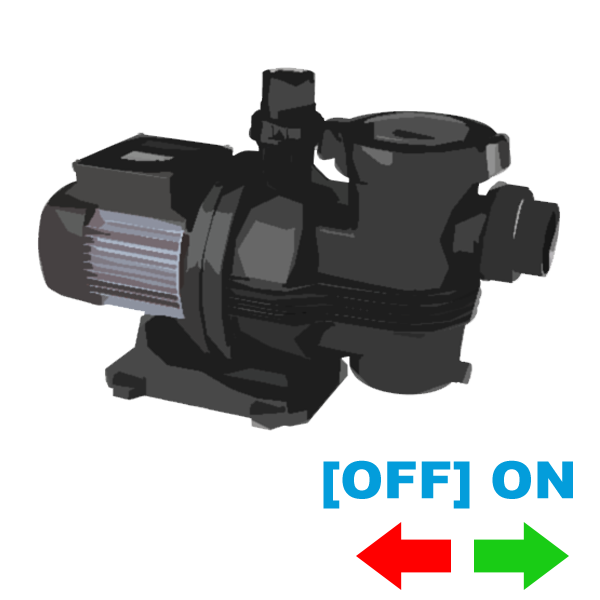


In a similar vein, if your pool pump continually powers on and off during use, then the problem is specifically related to the pump’s connection.
Possible causes:
- Insufficient voltage
- Poor wiring
Make sure that the required voltage of your pool pump matches the voltage received from the power supply (voltage info typically printed on pool pump). So if you have a 120v pool pump, then your power supply (breaker) must provide at least that much power
Double check the condition of the wires and connectors. And as mentioned earlier, make sure you’re using the correct gauge/size wire for your pool pump.
-Pool pump not filling with water | Troubleshoot pool pump not priming
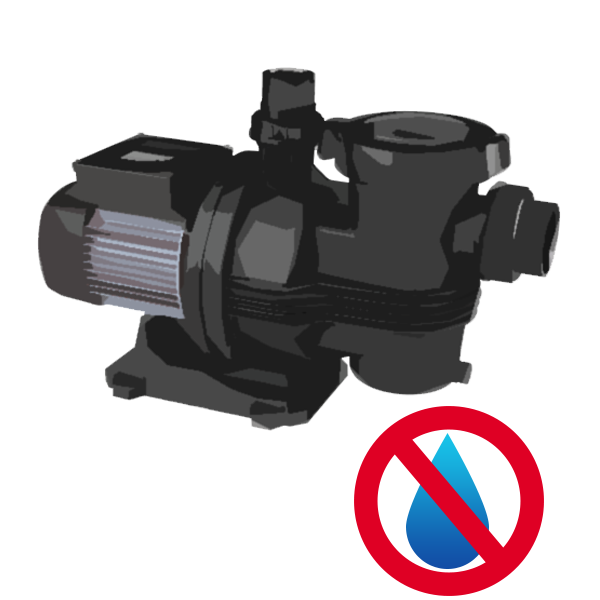


When your pool pump isn’t priming, you can essentially limit the source of the problem to the pump itself. So you won’t have to troubleshoot your pool pump all that much. But do keep in mind that fixing priming issues may involve opening the unit depending on the source of the problem.
Possible causes:
- Clog in pool system
- Clogged pump impeller
- Broken impeller
- Air leak on suction end of pump
- Pump is too far away/elevated
First and foremost, do a quick check up on your pool system. Check your skimmer baskets, pump basket, filter/filter cartridges, and anywhere else debris might collect. There may just be a clog forming somewhere else in the pool system that’s preventing water from flowing to your pump.
Once pool water goes through the pump basket, it makes its way to the impeller. That being said, trace amounts of debris may flow past the basket and accumulate over time. Causing the impeller to become clogged. So clearing it out should restore regular water flow to your pool system.
With age, rust can set onto the impeller shaft, which causes the impeller to eventually break off. In which case, replacing the impeller is the direct fix.
An air leak on the suction end of your pool pump can completely disrupt the pressure of your entire pool system. Making it difficult for the pump to circulate water. The cause of the air leak can be a crack in the housing, worn/broken O-rings, or worn out sealant. Most of which are replaceable. For cracks, a special sealant type is needed. Contact a pool repair service for the best recommendation.
As mentioned, if a pump is too far away from the pool, or too elevated, it’ll be strained to pull in water. Essentially fighting the forces of gravity. So readjust the positioning of your pump closer to ground level to get things back in order.
-Pool pump is pumping out air bubbles from return
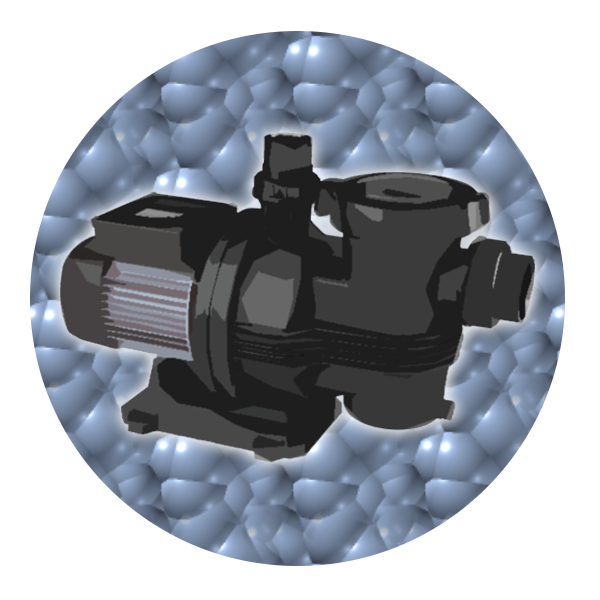


If you’re seeing an excess of bubbles coming out of your return jets, one thing is certain. You have a leak. And as long as your water levels are normal, the leak is most definitely related to your pool pump. But there’re a few ways that a leak can occur.
Possible causes:
- Bad thread sealant
- Bad/worn glue joints
- Loose/broken o-ring
- Loose/broken strainer cover
- Loose drain plugs in pump strainer housing
- Cracks in pump housing
Thread sealant is what keeps an air-tight lock on your inlets and outlets. Filling the microscopic air holes between the threads on PVC fittings. Purchase a tube of thread sealant and replace any worn down sealant.
Similar to thread sealant, glue joints are what hold not threaded PVC fittings in place. So you just follow the same steps to take care of the problem. You may be able to use certain types of sealants for both purposes.
O-Rings are necessary for creating an air-tight seal and sit around the strainer/pump basket cover and valve stems. Simply find the size of the O-ring and order a new set. Replacement is fairly simple, but some may need to open their units depending on the design. You may consider enlisting the help of a pool repair service for a quick and professional fix.
The strainer cover is what shields your pump basket from external debris and helps keep up pressure within the pump. But over time, natural wear and tear will set in, causing the threading to wear down or the plastic itself to crack. If that’s the case, replacing the cover should have your pump working as good as new.
Every pool pump has at least one drain plug built into the housing. And if it becomes loose at any point, you’ll notice a significant difference in pressure and water flow. So double-check and make sure they’re firmly in place and not too worn down.
At one point or another, a crack will eventually form on your pump’s housing. It’s just a natural side effect of countless hours of sun exposure. Luckily, fixing it is usually as simple as purchasing the right sealant and filling in the crack.
How To Troubleshoot Your Pool Pump | Closing Thoughts
We hope this guide on how to troubleshoot your pool pump helps you get back to enjoying your swimming pool. As you’ve learned from this article, a lot of fixes are as simple as having the right tools and parts for the jobs. But other fixes are a bit more technical. And if making the attempt yourself seems just a bit too risky, enlisting the help of a pool repair service is an excellent alternative. They’ll get the job done efficiently, and help spot any other potential pool pump problems you may have missed. And pool pump repair cost is often much less than pool pump replacement. So give it a try.
Did this guide help you troubleshoot your pool pump?


